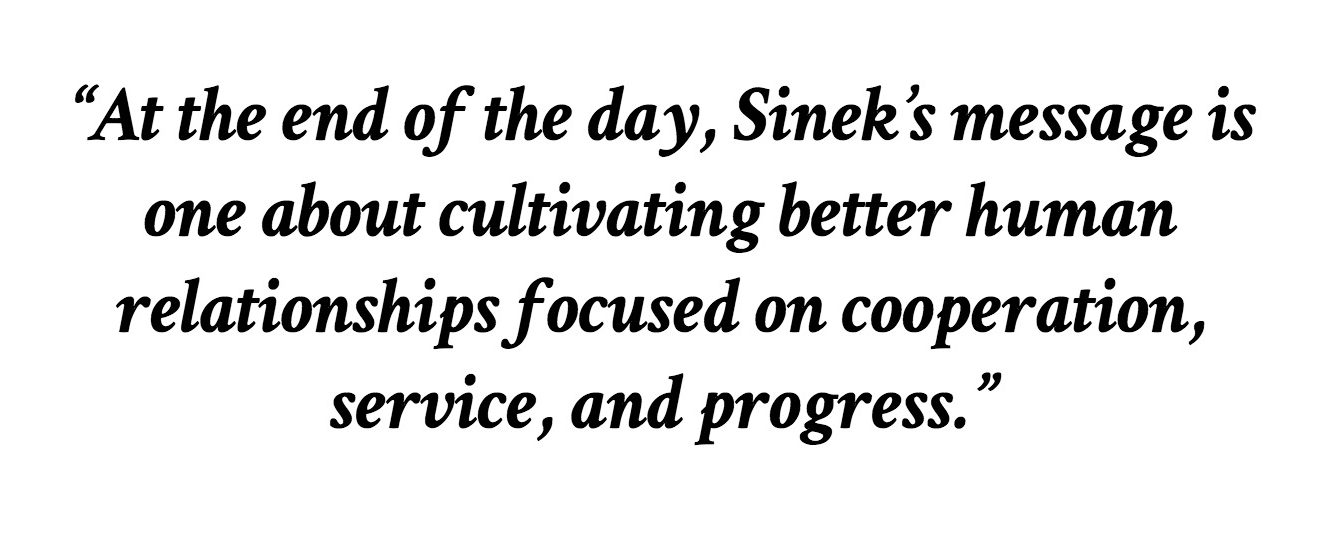In the infinite game of life, it’s not about winning or losing. It’s about growth and progress. A grand finish line of life does not exist because there is no end to the dangers, uncertainties, and opportunities for evolution. Self-proclaimed optimist and idealist Simon Sinek argues in favor of a shift from the win/lose perspective to one focused on helping others succeed. He envisions a world in which the industry of business is centrally concerned with empathy, authenticity, trust, safety, and cooperation. As an author, motivational speaker, and organizational consultant, Sinek boasts years of experience in training individuals and organizations to become better leaders and inspire those who follow them.
At the 2016 Live2Lead conference, Sinek proposed that great leaders must demonstrate two fundamental features: empathy and perspective. Listening to understand someone else’s point of view and sharing their feelings are abilities which allow leaders to design the right environment for those they lead. In this sense, the real job of leaders is to take care of those in their charge, not simply to be in charge. By describing the difference between finite and infinite games during his speech, Sinek identifies an important issue among modern companies who tend to misunderstand the game they are in.
While finite games have known players, fixed rules, and an agreed objective (take baseball, for example), infinite games have known and unknown players, changeable rules, and the objective of perpetuating the game.
There is no winning the game of business because there is no end to it. Instead of trying to be “Number 1,” those companies that actually understand the game they are playing work consistently to outlast and frustrate the competition. This perspective on business allows leading companies to focus on long-term gains and sustainable profitability.
However, gains and profitability occupy the periphery of Sinek’s work. His main priority zeroes in on why we get up out of bed in the morning and why anyone should care – the very purpose that drives us in life. Among the top three most popular Ted Talks of all time, Sinek’s 18-minute presentation from 2010 touches on the content of his first book, Start With Why (2009), and explores how great leaders inspire action. He explains the concept of the three-layered golden circle, where “what” you do represents the outer ring, “how” you do it is the middle section, and “why” you do it lies at the center. Starting with why enables people to inspire those around them by focusing on the purpose, the cause, the belief that motivates them to do what they do. He cites Martin Luther King Jr.’s famous speech as an example of this, noting that it was “I have a dream” not “I have a plan.” The people who showed up to hear King speak did not show up just to see him. They showed up for themselves and they showed up because they shared his belief in an equitable, peaceful society. Those who lead inspire us and we follow them because we want to, not because we have to. According to Sinek’s appraisal, the circle is the very reason companies like Apple Inc. are so successful and influential. They do business with people who believe what they believe, they sell a lifestyle, they start with why and work their way outwards to “how” and “what.” Sinek repeatedly emphasized:
“People don’t buy what you do, they buy why you do it.”
That idea connects to the concept of constructing a vision of the world as it should be. In his second book, Leaders Eat Last (2014), Sinek highlights the deeply rewarding feeling of working towards something bigger than ourselves when we are inspired by someone’s “why.” He claims a good vision statement explains what the world would look like if everything we worked towards was wildly successful. Even if it doesn’t always conclude 100% successfully, imagining a clear goal helps humans consistently move forward and measure progress.
Good leaders know exactly what the target looks like, they know what purpose they are working towards – even if they do not know how long it might take to get there – and they know how to encourage a safe, cooperative, and caring environment enabling people to work effectively and truly love what they do.
Leadership signifies a deep devotion and love for the people who have committed their lives to an enterprise and requires an immense amount of courage and sacrifice. Sinek has drawn parallels between leadership and parenthood in many of his publications, emphasizing how both leaders and parents work resolutely to help others succeed by sacrificing time and energy so that others may gain. He declared that great leaders, like great parents, want to provide their people with opportunity, education, and self-confidence so their people can achieve more than they ever could have imagined. Interestingly, many leaders make grave mistakes in sacrificing people to protect their own interests, while parents could never imagine “laying off” a child for their faults or errors. In this sense, good leadership requires wholehearted patience, responsibility, care, and service. In his second book, Sinek illustrates that when we do good for others, it inspires them to do good for others as well. Feelings of fulfillment come from helping others and exerting time and energy for someone else – without expecting anything in return.
During a conversation with Tom Bilyeu in a popular episode of Inside Quest (IQ), Sinek expands on the ideas of devotion, sacrifice, and courage. He argues there is no one event that will get people to trust you as a leader, it is rather an accumulation of little things that are done consistently in combination with other little things producing an environment conducive to effective leadership and a strong corporate culture. He reiterates that current corporate environments care more about short-term gains than about the life of the human beings in their care and are failing to improve cooperation, support, and fulfillment in a digital world. Leadership is effective when it increases confidence and showcases courageous and selfless acts. Sinek contends that every effective leader must have the courage to stand up to outside pressure and do the difficult thing. They must be willing to work to build the social skills of those in their care, slowly and consistently forming relationships and promoting trust. The things that really matter in life – joy, fulfillment, love, self-confidence, strong relationships, job satisfaction – they all take time and effort. The logic of instant gratification that today’s young generation has grown up with runs counter to that. Sinek insists that the leaders of today have to run the extra mile and take additional steps to address the problems millennials face in the workplace and to meet the demands of a tech-focused, impatient, insecure, and anxious generation.
Although these ideas seem relatively straight-forward, helpful, and inspirational, Michael Schein has put forward a critique of Sinek’s work. With a background in advertising, Simon Sinek has become an expert at selling his ideas. He knows very well how to deliver a message and ensure the maximum agreement and support from his audience. Schein mentions how Sinek often relies on describing his ideas as laws of biology, using scientific lingo to elevate their authority. Apparently, he speaks with utter confidence in an unthreatening tone that establishes his persona as an “undisputed alpha thinker.” There may be some truth to this criticism. Nevertheless, Sinek’s vision of revolutionizing our work and our lives is clear and worthy of attention. He advocates for a radical shift in leadership to cultivate a more secure, supportive culture.
As one year transitions into the next, we are constantly confronted by a resounding narrative of self-help, improving your own life, maximizing your success, and making more money. But this begs the question: why approach the new year from a self-obsessed angle? Why not make it about improving others’ lives through leading responsibly, demonstrating courage, and being unafraid of sacrifice? Why don’t we make it about maximizing our collective progress and life fulfillment? Maybe we should stop asking whether we measure up to our peers or whether we should change ourselves to better fit an ideal.
Maybe we should ask instead: Am I better than I was yesterday? Am I serving my community and myself to the best of my ability? Am I leaving behind a positive legacy by creating a safer world for those who follow in my footsteps?
It is no secret that what matters in life takes time, energy, practice, and perseverance. Maybe it’s time to remember that and re-align our objectives accordingly.
At the end of the day, Sinek’s message is one about cultivating better human relationships focused on cooperation, service, and progress. He insists everything we need to be effective leaders is already within us. The capacity for empathy, the potential to promote powerful human connection, the ability to give generously, the will to cooperate, the desire to do better. He believes that every single person has the right to wake up and be inspired to go to work, love what they do, and be fulfilled in life. Without coercion, without pressure, and without force, we can all find an environment in which trust and empathy build a supportive, safe society. To grow and progress, leaders and those they lead must consistently work on helping each other succeed. If they do, security, self-esteem, and innovation can flourish.




